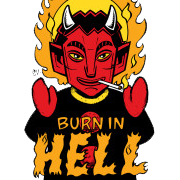|
Snowman_McK posted:Would you mind elaborating on what 'cosmological sense' means? I'm not being facetious, I have honestly never encountered those two words together before. By cosmology I should be clear that I don't mean scientific cosmology, but religious cosmology. In the religious sense, cosmology describes not necessarily a study but a structure of beliefs regarding the origins and ultimate fate of the universe. Fury is loaded with cosmological imagery that is treated in the film proper as part of a self-contained cosmos or universe, which is itself a metaphor for the ultimate fate of war. The film opens with a silhouetted Nazi captain emerging from the darkness and smoke astride a white horse. And while in colloquial terms the words "white" and "pale" are often erroneously equated, this figure represents the apocalyptic spectre of Death as revealed in Revelations. Nobody else is alive, this figure rides alone consumed in a chaotic void that currently lacks form. We don't see the battle that 'created' this world, and so we are left instead with the formless void, the Genesis of War. Emerging from the formless void is a lone figure who will soon come to be revealed as Wardaddy (literally the Father of War), who leaps upon the figure of death and tellingly stabs him in the eye. The imagery of the eye recalls the Germanic pagan deity Odin/Wotan, except rather than a self-sacrifice in order to attain wisdom, this act is inverted as a desecration of German volk culture initiated by an invading force. This imagery is made doubly potent when Lerman's character discovers half of the previous gunner's face inside Fury, specifically his cheek and dead eye. The Genesis of Fury is the staging of an alchemical exchange between the invading and occupying forces, each representing tacitly different spiritual ideologies but ultimately feuding for dominance over the same 'formless void' of chaos: Christianity for the Allies, and Volk paganism for the Nazis. Of course, both of these spiritual perspectives are, indeed, more rhetorical than literal. Only Bible abstains from sex with 'the conquered women,' and the Nazis/German people clearly aren't pagans. Rather, War itself is the religion, forming the entire foundation of the film's cosmos. The final battle sequence distills this cosmological metaphor through yet another alchemical exchange: The same beings that first emerged from the 'formless void' of Genesis are now committed to their ultimate apocalyptic fate - their death in the service of their religion. Ayer represents this vividly by this time having Lerman/"Machine", the gunner, survive the ordeal, but his comrades fall, looking back as Ayer's dissolves twice to a God's eye view looking down on the ultimate fate of the Fury, forming the iris of an eye looking back out upon the viewer. What we see in the end of the film is a cyclical wraparound to the 'formless void' of the opening, in anticipation of a ceaseless cycle of war. Apocalypse leading to new Genesis. Now that we reach the end, the imagery of the eye also works in another cosmological sense: "An Eye for an Eye."
|
|
|
|

|
| # ? Jun 4, 2024 14:16 |
|
K. Waste posted:By cosmology I should be clear that I don't mean scientific cosmology, but religious cosmology. In the religious sense, cosmology describes not necessarily a study but a structure of beliefs regarding the origins and ultimate fate of the universe. Fury is loaded with cosmological imagery that is treated in the film proper as part of a self-contained cosmos or universe, which is itself a metaphor for the ultimate fate of war. That's a really cool reading. Mine seems like a really petty complaint after that lyrical loving analysis. It's not quite a tactical realism thing (I'm not an expert, or even really an enthusiast) it just felt out of place. Every battle in it was horribly brutal. It was messy, and really captured just how vague and terrifying their viewpoints were. Every victory seemed to come with a steep cost, and death was painted as being everywhere, cruel, quick and random. Then, in the last battle, hundreds of elite German soldiers just throw themselves at a fixed position. It works well at first. It was a great battle scene. Then it just went on too goddamn long. It was long enough that I started to see the seams, I started to wonder just why these Germans were so stubborn about attacking this position from the same direction. I started to spot contrivances of the scene, like the guys who are literally 3 metres away firing no weapons, just running so that Pitt can casually shoot them. The Germans forget about those really effective anti tank weapons they handed out to children in the first act. They forget that they actually have guns for much of it. It's not really unique to Fury. It's all the same cliches as in every other "heroic last stand" and there's the problem. It's all those cliches. And the scene is long enough for immersion to be broken and for me to just start counting the cliches. Plenty of bits in it are still great, but it's twenty minutes. It's essentially a short film, which is more than enough time for my immersion to be ruined.
|
|
|
|
Snowman_McK posted:Then, in the last battle, hundreds of elite German soldiers just throw themselves at a fixed position. It works well at first. It was a great battle scene. Then it just went on too goddamn long. It was long enough that I started to see the seams, I started to wonder just why these Germans were so stubborn about attacking this position from the same direction. I started to spot contrivances of the scene, like the guys who are literally 3 metres away firing no weapons, just running so that Pitt can casually shoot them. The Germans forget about those really effective anti tank weapons they handed out to children in the first act. They forget that they actually have guns for much of it. I can agree with the general thrust of that complaint, but there's one particular thing that's being brought up regularly that I'd disagree with: If I remember correctly, nowhere in the movie it's ever stated that the battallion is in any way elite. All it does say is that they're SS, which I'd argue is mostly supposed to minimise any moral ambiguity by drawing a connection to the mostly SS-perpetrated crimes we'd seen up to that point. Essentially it's to impress upon the viewer that those guys really have it coming, so to speak. While towards the beginning of the war there were a bunch of elite Waffen-SS formations, the same does not necessarily hold true in 1945. They might as well have been a highly motivated but completely untested rear-line police unit pressed into frontline duty as a last resort. The movie even makes a point of showing that they're pretty poorly supplied, having only two crates of (usually rather ubiquitous) panzerfausts left. It's still a bit of an annoyance, but I'd say the segment works better if you watch it with the perspective that you're seeing a bunch of people with little to no experience facing an unknown obstacle in the middle of the night. Fog of war, and all that. Arguably you could also read it as an act of hubris on the SS-commander's part, a conviction that with their obvious superiority they should be able to just brush aside a single obstacle like that in one swoop by virtue of esprit alone, rather than take the "cowardly" option of circumventing it entirely. They were also under a certain degree of time pressure, as the bulk of the american forces were set to reach that same crossing on the very next day, which would have contributed to that stance.
|
|
|
|
They subtly hint at the composition of the SS brigades throughout the film, but you see it up close at the end: political officers barely out of their teens, some hardened professional soldiers, and a shitload of doomed die-hards who only know enough to point and shoot. A key thing to keep in mind all throughout Fury is that it takes place in the closing weeks and months of the war, which gives it a very strange vibe.
|
|
|
|
Hell, even earlier in the war there were some SS brigades that were basically just penal units. The Dirlewanger brigade was literally a bunch of convicted rapists and murderers, and they got decimated like 4 different times. They lost almost a hundred men while they were out murdering unarmed civilians, somehow (the leading theory is friendly fire + alcoholic rages). It definitely became more noticeable in the closing days, though, since they just started grabbing anyone they could find, including children and people from the areas they were occupying. There was briefly an entire SS brigade composed of Bosnian Muslims, for instance.
|
|
|
|
And, of course Come and See features a unit essentially based on Dirlewanger's Circus. The SS feature prominently as villains not because they were some kind of elite or effective fighting force but because of their infamies.
|
|
|
|
Man, Come and See is a good movie.
|
|
|
|
Perestroika posted:I can agree with the general thrust of that complaint, but there's one particular thing that's being brought up regularly that I'd disagree with: If I remember correctly, nowhere in the movie it's ever stated that the battallion is in any way elite. All it does say is that they're SS, which I'd argue is mostly supposed to minimise any moral ambiguity by drawing a connection to the mostly SS-perpetrated crimes we'd seen up to that point. Essentially it's to impress upon the viewer that those guys really have it coming, so to speak. While towards the beginning of the war there were a bunch of elite Waffen-SS formations, the same does not necessarily hold true in 1945. They might as well have been a highly motivated but completely untested rear-line police unit pressed into frontline duty as a last resort. The movie even makes a point of showing that they're pretty poorly supplied, having only two crates of (usually rather ubiquitous) panzerfausts left. Elite or no, hundreds of them just running towards a position without even firing was a bit much. It feels like a battle scene from a different movie. In the film's first battle, in the clearing, they really cleverly give you a sense that they don't really know what they're firing at much of the time. They're firing into tree cover or smoke, aiming at muzzle flashes and hoping for the best, and the film captures just how little they actually see. Then, come the final battle, they're cutting down heavy weapon teams in the dark right as they set up. They seem omniscient. Again, it would be a fine scene, in a different movie. If it had been in my hands, I would have ended it right after the first charge. They have a moment of triumph, Pitt goes for the ammo, and that's where they'd all get killed. They made a statement, they aimed for a heroic last stand, but at the end of the day it's still 5 guys firing from a static, vulnerable position. It would be in keeping with the tone of the rest of the movie
|
|
|
|
That's the point - there's nothing heroic about it. There are no concrete stakes to holding the crossroads, at least no ticking clock that establishes that 'x' will happen if this SS column isn't stopped. From the very beginning of the film, the destruction of the Nazi regime is a foregone conclusion and the entire film is about the bitter end. Think about a scene earlier in the film, as the tank column rolls on and Wardaddy pauses to view the war in heaven, which is a squadron at most of Luftwaffe fighters versus what looks like an armada of Allied warplanes. Why should they be fighting on? Plenty of Germans deserted and surrendered. Fury's a film about war as a supernatural force.
|
|
|
|
HUNDU THE BEAST GOD posted:That's the point - there's nothing heroic about it. There are no concrete stakes to holding the crossroads, at least no ticking clock that establishes that 'x' will happen if this SS column isn't stopped. From the very beginning of the film, the destruction of the Nazi regime is a foregone conclusion and the entire film is about the bitter end. Think about a scene earlier in the film, as the tank column rolls on and Wardaddy pauses to view the war in heaven, which is a squadron at most of Luftwaffe fighters versus what looks like an armada of Allied warplanes. Why should they be fighting on? Plenty of Germans deserted and surrendered. Fury's a film about war as a supernatural force. And that's my problem. It ends up feeling like a heroic stand, because it goes on so long and requires so many contrivances to keep going. Even when the main gun fails, and both machine guns are out of bullets all at the same time, they have enough time to reload and keep slaughtering nazis. Their heroic stand works. It's not a pointless gesture in a pointless part of the war, which is what it seemed to be building to. One tank crew kills 300 or so German soldiers. It seems like a scene that couldn't have happened in the same movie where a tank is unexpectedly killed by two child soldiers. Where only a rigid formation and constant communication lets them win the battle in the clearing (which is seriously one of the best battle scenes ever), where a Tiger tank knocks out three American tanks before it's destroyed. It would be a perfect ending if it was about a third the length or so. Talking back to your point about the planes, yes, we're shown that the American army is tired and not particularly well equipped, but still at an overwhelming advantage against the remnants of the German army. Then a fully equipped, seemingly well motivated regiment pops up, vastly outnumbers the Americans, and still gets slaughtered.
|
|
|
|
HUNDU THE BEAST GOD posted:That's the point - there's nothing heroic about it. There are no concrete stakes to holding the crossroads, at least no ticking clock that establishes that 'x' will happen if this SS column isn't stopped. They are sent to stop that SS column to prevent it from running into the supply line of the Allies. I thought it was made pretty clear that there is a big train of support vehicles, cooks, medics and other non-combat personnel completely exposed and it will be a slaughter if the SS stumble into them.
|
|
|
|
I've enjoyed the two people arguing about this movie in the comments section on an article I came across recently. Very entertaining: http://moviepilot.com/posts/2015/02...rsation=2706511
|
|
|
|
BioTech posted:They are sent to stop that SS column to prevent it from running into the supply line of the Allies. I thought it was made pretty clear that there is a big train of support vehicles, cooks, medics and other non-combat personnel completely exposed and it will be a slaughter if the SS stumble into them. Very true. I appreciate that the film doesn't harp on this to turn it into some kind of heroic sacrifice. I mean, where is the crew of Fury headed ultimately? Alone to link up with some other formation? They're heading to a crossroads.
|
|
|
|
Waroduce posted:i didn't really see this and i think its hard to take a message about american strategy in iraq from the movie Sure, why not: let's begin with the fact that it just skips forward from 9/11 to the War In Iraq. In effect, it takes it on faith as the direct cause of the Iraq War, which is fine and everything, since the film is about a Soldier and his Service. The problem is that Kyle both has no character and the film is a reflection of him by taking his point of view; he is unquestioning of the whys and wherefores so we have this amazing contrast to this ignorant (but innocent) naif who is just one hell of a soldier. We are treated to scenes where he spontaneously invents HUMINT and inevitably laments the incorrigible savagery of the enemy, he's just trying to bring democracy and decency to this lawless by doing his job, which is shooting people. He's a world cop with his finger on the trigger, and the film's way of humanizing him is to show him pretending that it doesn't bother him. Why does the film stop there, but spend so much time treating war as merely a depressing chore? Both perspectives, such as they are, come up short. It's a really pent up film and it's not hard to see why; cut out the loonier details of the context and indeed the person it depicts and suddenly you're left with something much more unpalatable.
|
|
|
|
HUNDU THE BEAST GOD posted:Sure, why not: let's begin with the fact that it just skips forward from 9/11 to the War In Iraq. I dont see how this has anything to do with American strategy in Iraq. You generously said yourself it's a film, Id say propaganda piece, about a soldier and his service. He does 'cool missions' and uncovers HUMINT irt the Butcher because its part if building the myth of the character. He does all these things, wows, hes awesome. The world policemen thing is a bit too deep of a read for me, he is a character acting out set pieces to look cool and it is hard for me to see anything deeper than this. The movie is about the character, not American strategy. I guess maybe I am missing some part of understanding your post, or would like you to frame how you are using the term strategy for me. I am not a movie critic, but I am familiar with the Iraq war. I do not see any strategic commentary in the movie. There is nothing regarding COIN, the tribal awakening, a comparison between pre/post surge Iraq, a discussion of armed patrols blowing through neighborhoods, or the transition to dismount patrols, smaller fobs and an ink-blot strategy, nothing. And it would have been a very interesting vehical to explore this because Kyle was in Ramidi and Al-Anbar where and when Americans had some of their first successes in the strategic about-face under Patreous, but I do not see it.
|
|
|
|
I'm pretty familiar with it too, I'm not saying the movie has to get into McChrystal/Petraeus and the ouster of Chalabi and specifics about the three-way ethnic split of the state and all that. I'm saying that total indifference to the specifics and the pushing of an agenda is what got us into Iraq in the first place, and the movie deals with that by not addressing it at all. Kind of like one of the architects of the war vehemently denying for years that there was an insurgency, or that moron Bremer destabilizing the entire country with the stroke of a pen. The strategy is that there was no strategy, and the film's response to that profligacy is just a bland exhortation to support the troops. If it's so about Kyle, why doesn't it then focus more on the guy's inner life, even if it doesn't want to parrot his jingoistic mindset verbatim? The film just falls down any way you look at it.
|
|
|
|
HUNDU THE BEAST GOD posted:
Well I think that is the reason. I think they(Eastwood I guess, but I'm sure others were involved in these decisions) knew that if they focused too much on Kyle's inner thoughts and feelings it wouldn't go well regardless of which direction they decided to go with it. If it was brutally honest portrayal of his hosed up mind, it would piss people off and be criticized as taking a poo poo on the troops. If it was a white-washed version that leaves out any of the nasty stuff then the film would have been criticized for changing what's in the book for political/financial reasons. I don't think they realized that the inner workings of Kyle's head are what's interesting about his story and not giving that the attention it deserved totally cut the balls off the whole movie. I just watched The Master for the first time and its says a whole lot more about what war does to soldiers than American Sniper does.
|
|
|
|
Basebf555 posted:I don't think they realized that the inner workings of Kyle's head are what's interesting about his story and not giving that the attention it deserved totally cut the balls off the whole movie. If they went too deep into Kyle's mind, maybe he just becomes an outlier though, and not representative. Plus it might detract from what I believe to be the main intention behind the movie (besides making money), which is that we should appreciate and support out troops who are out there doing terrible things on our behalf (whether we want them to or not).
|
|
|
|
socketwrencher posted:If they went too deep into Kyle's mind, maybe he just becomes an outlier though, and not representative. Plus it might detract from what I believe to be the main intention behind the movie (besides making money), which is that we should appreciate and support out troops who are out there doing terrible things on our behalf (whether we want them to or not). I'm not really disagreeing with you, but man that is a hosed up message. Who appreciates when somebody goes out and does something terrible on their behalf, something that they didn't want in the first place? I'm somewhat of a pacifist though so the whole "sometimes war is necessary" thing doesn't really sit well with me. I sympathize with soldiers and admire some of the qualities they often have, but its very rare that I feel like I can support their actions.
|
|
|
|
socketwrencher posted:If they went too deep into Kyle's mind, maybe he just becomes an outlier though, and not representative. Plus it might detract from what I believe to be the main intention behind the movie (besides making money), which is that we should appreciate and support out troops who are out there doing terrible things on our behalf (whether we want them to or not). I would appreciate it if power tripping creeps who hawk for war but dodged the draft themselves did not waste the lives of our servicemen in senseless, illegitimate wars.
|
|
|
|
Basebf555 posted:I'm not really disagreeing with you, but man that is a hosed up message. Who appreciates when somebody goes out and does something terrible on their behalf, something that they didn't want in the first place? I'm somewhat of a pacifist though so the whole "sometimes war is necessary" thing doesn't really sit well with me. I sympathize with soldiers and admire some of the qualities they often have, but its very rare that I feel like I can support their actions. Yeah it's a tricky issue. If war is necessary- and I believe that there are circumstances where it is- then terrible things will be done and horrific suffering will be endured on all sides. In such cases, I'd appreciate and support the troops. The problem of course is when war is not justified. I place the blame on politicians and governments in such cases and less on the troops, but agree that's it's hard to support what the troops would be doing. This is why it's so important, and so much more interesting and thought-provoking, to add political context. My impression is that Eastwood is anti-war, and sincerely cares about the effects of war. If that's the case, then omitting political context- and I don't mean a heavy-handed treatment, even brief, interspersed scenes of Congress voting on the Iraq War Resolution, approving emergency funding, etc. would suffice- seems both irresponsible and counterproductive. Some kid from Texas isn't the driving force behind war; people that we elect are. I suspect that Eastwood runs into trouble because he also believes in peace through strength via carrying a big stick, and ends up making rather simplistic movies because adding political comment could lead to people questioning the need for a strong defense. It's unfortunate, because I think he has the chops and the studio support to pull off a great movie about war that could show more sides of the story without detracting from his primary points of view. If ever such a movie were needed, now seems about the time.
|
|
|
|
HUNDU THE BEAST GOD posted:I would appreciate it if power tripping creeps who hawk for war but dodged the draft themselves did not waste the lives of our servicemen in senseless, illegitimate wars. Exactly. I don't know if I'd put Eastwood in the hawking for war category though. I do think he believes in the necessity of war. Just a guess.
|
|
|
|
socketwrencher posted:Exactly. I don't know if I'd put Eastwood in the hawking for war category though. I do think he believes in the necessity of war. Just a guess. He definitely does, he would be a paleoconservative or whatever these days. But if he is indeed highlighting the confusing, debilitating effect war has on the grunt, even Exceptional Warriors like Chris Kyle, don't you think he pussyfoots around it in a really odd way? I just couldn't get a good read on his naked compassion for this guy's plight and it's not like he's not capable, because he's made stuff like Letters from Iwo Jima.
|
|
|
|
HUNDU THE BEAST GOD posted:He definitely does, he would be a paleoconservative or whatever these days. But if he is indeed highlighting the confusing, debilitating effect war has on the grunt, even Exceptional Warriors like Chris Kyle, don't you think he pussyfoots around it in a really odd way? I just couldn't get a good read on his naked compassion for this guy's plight and it's not like he's not capable, because he's made stuff like Letters from Iwo Jima. I wouldn't be surprised if Eastwood would say that he didn't want to tell audiences what to think, that he was just presenting one (albeit extraordinary) soldier's story. Now obviously by cleaning up Kyle's story and only showing what he showed, he's shaping the content, but maybe the pussyfooting was intentional- his way of trying to get people to draw their own conclusions. And Kyle's story- while not perfect- would sell tickets, so more people would be thinking (however superficially) about war and its effects, which I believe is important to Eastwood. Note that those effects in the movie were all negative. So maybe the motivation behind omitting certain things about Kyle was not so much to paint him as a hero, but to take away some of the things that people might view as cool and possibly even attractive about war, like him enjoying the hell out of shooting people. What remains is a movie where everything associated with war turns out badly, and it's hard to come away from that thinking that war is good.
|
|
|
|
At the end of the day, when all is said and done, he'll always be known as the guy with the kill count. Officially he's at 160. By his own count he claims twice that. Let's cut the difference and put him at 240. Movie's 132 minutes so that's a kill almost every 40 or so seconds give or take. I want to see THAT movie. Just watch a guy get ground down by the weight of his own number and see what he's done and all the different types of people he ultimately put his scope on.
|
|
|
|
I want to see a shot for shot remake of American Sniper but it's called German Sniper and Chris Kyle is a Wehrmacht soldier and he's shooting Russian women and children. The exact same movie except Kyle is a soldier for the Nazi regime and he's shooting Russians defending their homeland. I'd release it on Christmas Day. Just strip away the whole contemporary American identity politics angle and let's see what kind of movie it is at its foundation.
|
|
|
|
Popular Thug Drink posted:I want to see a shot for shot remake of American Sniper but it's called German Sniper and Chris Kyle is a Wehrmacht soldier and he's shooting Russian women and children. The exact same movie except Kyle is a soldier for the Nazi regime and he's shooting Russians defending their homeland. I'd release it on Christmas Day. Just strip away the whole contemporary American identity politics angle and let's see what kind of movie it is at its foundation. https://www.youtube.com/watch?v=ojB5fpoeQ2c (  ?) ?)
|
|
|
|
Popular Thug Drink posted:I want to see a shot for shot remake of American Sniper but it's called German Sniper and Chris Kyle is a Wehrmacht soldier and he's shooting Russian women and children. The exact same movie except Kyle is a soldier for the Nazi regime and he's shooting Russians defending their homeland. I'd release it on Christmas Day. Just strip away the whole contemporary American identity politics angle and let's see what kind of movie it is at its foundation. Every nation has its soldiers and every war has its reasons. Up to you how you feel about them.
|
|
|
|
Smoothrich posted:Every nation has its soldiers and every war has its reasons. Up to you how you feel about them. It is actually not up to people how they feel about them, that is kind of the point of propaganda (and all good marketing for that matter). It is why American Sniper is effective propaganda. It displaces the horrors of war to the side that afflicted said horrors (and experienced far less than its victims) and directly tries to reinforce a false narrative for the war while simultaneously pretending it is taking a neutral stance.
|
|
|
|
Is there a :sethrogan: smilie?
|
|
|
|
Sasquatch! posted:Is there a :sethrogan: smilie? I think it's this one.
|
|
|
|
Just saw it. It's astounding just how much they tip-toe around the controversial questions. If you took this movie as a source, the entire Iraq fiasko was a retaliation for 9/11, and Al Qaeda was the major enemy in Iraq. Wow I really hate this movie. Not the least because one character is called Biggles. Now someone will think I'm such a tool that I named myself after a secondary character in a shameless propaganda fest of a movie.
|
|
|
|
BigglesSWE posted:Just saw it. It's astounding just how much they tip-toe around the controversial questions. If you took this movie as a source, the entire Iraq fiasko was a retaliation for 9/11, and Al Qaeda was the major enemy in Iraq. I'm curious why you consider it propaganda. 9/11 and Al Qaeda were part of the rationale for invading Iraq, even if the links between them were tenuous at best and complete lies at worst. Was there anything good about the war or its effects shown in the movie? Anything positive that was achieved? Any romanticization of Kyle and his exploits?
|
|
|
|
socketwrencher posted:I'm curious why you consider it propaganda. 9/11 and Al Qaeda were part of the rationale for invading Iraq, even if the links between them were tenuous at best and complete lies at worst. Was there anything good about the war or its effects shown in the movie? Anything positive that was achieved? Any romanticization of Kyle and his exploits? No mention of Saddam Hussein. No mention of WMD's. No questioning of the motives for the war. The fact that the main character basically says a soldier died because "he stopped believe in the cause". Basically trashtalking soldiers who speak up against war. Very one-sided views of the Iraqi people, be it insurgents or civilians. They go around calling them "savages" and then basically every single Iraqi portrayed in this movie is somehow involved in insurgent activities. They even claim that the only people left in Fallujah are there to "kill Americans". Basically what has been said numerous times in this thread, by far more competent writers.
|
|
|
|
BigglesSWE posted:No mention of Saddam Hussein. You answered a completely different question than what was asked. socketwrencher posted:Was there anything good about the war or its effects shown in the movie? Anything positive that was achieved? Any romanticization of Kyle and his exploits?
|
|
|
|
socketwrencher posted:I'm curious why you consider it propaganda. 9/11 and Al Qaeda were part of the rationale for invading Iraq, even if the links between them were tenuous at best and complete lies at worst. Was there anything good about the war or its effects shown in the movie? Anything positive that was achieved? Any romanticization of Kyle and his exploits? The problem is that the film doesn't approach those justifications as tenuous. It deliberately attempts to legitimize them. It's no accident that the film shows Kyle gasping at footage of 9/11 right before it cuts to him in Iraq, despite the fact that the real Kyle explicitly joined because of the embassy bombings in Tanzania and Kenya. The implication is that even if the government was lying, by god, it was real enough for Kyle! It also makes for a cleaner, more convenient political narrative. And uh, I would say the whole "tortured warrior with a heart of gold" approach is a pretty romanticized view of Kyle, yeah. The film is propaganda because it's historical revisionism that attempts to deflect critique American policy by hiding behind the troops. The whole "well maybe Iraq being tied to WMDs and 9/11 is pure bullshit, but now the troops are over there and we have to support them no matter what" is exactly the reason that we spent 8 loving years running up a death toll there. Playing Kyle up as a tragic but noble man who killed and sacrificed for his country's freedom (ignoring and dehumanizing the civilian population of the unjustly occupied Iraq) is a pretty jingoistic agenda. The reason the film focuses on Kyle and divorces him from the larger political context is that it's pretty easy to distract an audience from the deeper horrors of war when you have a martyr to trot out. edit: The film doesn't need to be literally saying "war is good" to be propaganda, hth. Grizzled Patriarch fucked around with this message at 02:23 on Feb 22, 2015 |
|
|
|
Pretty much any movie about Iraq will be considered propaganda regardless of how you spin it, so you might as well try to justify the sky being blue while you're at it. And showing a dude having troubles dealing with life might be romanticizing, but that makes literally any war movie that has PTSD somewhere in there is the same thing. Should film makers just ignore PTSD completely from now on due to the risk of romanticizing a touchy subject? I don't think the movie showed anyone with a heart of gold until maybe the last 20 minutes. All of his stateside scenes were portraying a pretty lovely human. Cole fucked around with this message at 02:25 on Feb 22, 2015 |
|
|
|
There are plenty of ways you could make a film about Iraq that isn't propaganda. They could have made a movie about Chris Kyle that wasn't propaganda. Eastwood just didn't.
|
|
|
|
The movie whitewashes the Invasion of Iraq by suggesting that the operation as whole was in response to the terroristattacks at 9/11. Which is...um, a very simplified version of the events in question, to say the least. Propaganda ain't all about hailing the GOOD a side is, it's also about pushing away the BAD stuff that the side might have done out of the way, so noone can see it. If it portrayed the war as having a positive outcome? Well, no, not really, but it handles it like a legitimate and just cause (which it so totally wasn't in my opinion) and steps around any awkward questions about the US conduct in the whole operation. It even makes a point to have the main character state that NOT having faith in his cause is what caused another soldier to end up KIA. And uh yeah, there's a whole ton of romanticization of Kyle. As stated earlier in this thread, he was a very...controversial figure, something this movie took a glance at for a scene or two and then proceeded to make him a übersoldier who goes out of his way to get the job done, even disobeying orders in the process (no apparent reaction from the brass, 'cause he's the "Legend" and all that, he can do whatever he wants I guess). His idea of PTSD curing (taking broken down soldiers to a fireing range) seems to me to be a very questionable idea but the movie seems to think otherwise. Until the ending ofcourse... edit. That Grizzled fella up there said things much better than me. ^^ BigglesSWE fucked around with this message at 02:29 on Feb 22, 2015 |
|
|
|

|
| # ? Jun 4, 2024 14:16 |
|
Grizzled Patriarch posted:There are plenty of ways you could make a film about Iraq that isn't propaganda. They could have made a movie about Chris Kyle that wasn't propaganda. Eastwood just didn't. How? Because if you go the other way with the story and show Iraq for the colossal fuckup it was, you will have a completely different group of people saying it is anti-war and anti-troop propaganda.
|
|
|























